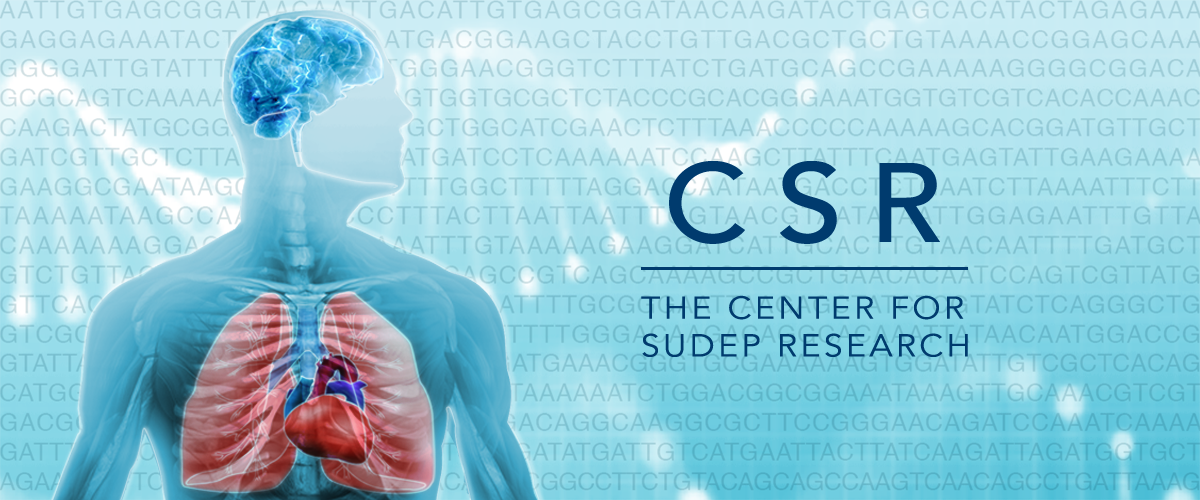
- What is SUDEP?
- CSR Collaborative Research
- About CSR
- The CSR Charter
- Participating Centers
- Sponsors & Partners
- CSR Pilot Programs
- Recent Funded Projects
“SUDEP refers to the sudden, unexpected death of an individual, with a diagnosis of epilepsy, who dies suddenly, in benign circumstances, without a structural or toxicological cause for death being found at autopsy.”
Awareness is the first step in finding the cause and prevention of SUDEP.
- What causes SUDEP?
- Risk factors for SUDEP?
- What is the incidence of SUDEP?
- Minimizing the risk of SUDEP
CSR investigator is awarded $1.7 million grant for SUDEP artificial intelligence study. 5/18/2020
|
|
Dr. Licong Cui (PhD) has been awarded a five-year NIH/NINDS R01 grant to study SUDEP risk markers in the prospective data collected by the CSR’s Autonomic and Imaging Biomarkers of SUDEP project. Identification and communication of alterable SUDEP risk factors to affected patients is an important strategy to lower SUDEP incidence. However, systematic individualized assessment of SUDEP risk is currently unavailable. In this project, Cui proposes to develop SURME, a SUDEP Risk Marker Extraction system for automated extraction of known and putative SUDEP risk markers from the multimodal patient data collected by the Center for SUDEP Research including patient epilepsy monitoring unit evaluations, follow-up forms, and electrophysiological signals. Success of this study will enable systematic SUDEP risk assessment based on known and putative factors and communication of such risk factors to patients with epilepsy. Ultimately, this study will lead to individualized evidence-based SUDEP risk assessment tools that help clinicians and patients manage potentially modifiable risks, leading to overall reduced SUDEP mortality and improved epilepsy patient care. |
The Center for SUDEP Research (CSR) is a National Institute for Neurological Disorders and Stroke (NINDS) funded Center Without Walls for Collaborative Research in the Epilepsies.
This milestone-driven collaboration is composed of researchers from 14 institutions across the United States and Europe and brings together extensive and diverse expertise to understand Sudden Unexpected Death in Epilepsy Patients (SUDEP).
The CSR's scientists and physicians investigate and elucidate these links with their expertise in molecular biology, genetics, histopathology, electrophysiology, brain imaging, data analysis, and more. The team will identify the molecular and structural brain abnormalities underlying SUDEP, utilize these discoveries to identify features that could predict and identify those at risk of SUDEP, and hone in on those targets for the development of potential therapeutic interventions.
Overall, this investment by NINDS over nearly five years promises to catalyze research on SUDEP and dramatically enhance our understanding of this poorly understand and devastating phenomenon.
The CSR brings together leading investigators, clinical and basic science projects, multidisciplinary technology and advanced resources to form a collaborative network dedicated to significantly reducing SUDEP mortality. This spirit of collaboration includes timely sharing of ideas without compromising intellectual autonomy, ownership, and credit.
Members sign the Charter Agreement and agree to a principle of transparency, with particular regard to future grant applications leveraged by CSR, and forthcoming peer reviewed publications, conference presentations, press releases, and other materials arising directly from CSR activities.
A key strategy is to provide each CSR investigator and research group with regular, expedited access to expertise and knowledge as well as core facilities that may not otherwise be available to them.
CSR members are encouraged to share any relevant activities that do not directly arise from CSR resources, cores or scientific projects. Our goal is a broader collaboration within the scientific community to advance knowledge about SUDEP.
This milestone-driven collaboration is composed of researchers from 15 institutions across the United States and Europe and brings together extensive and diverse expertise to understand SUDEP or sudden unexpected death in epilepsy.
 |
 |
 |
 |
 |
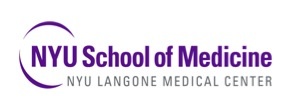 |
 |
 |
 |
 |
 |
 |
 |
 |
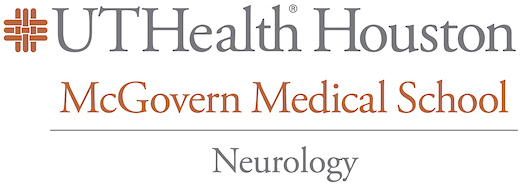 |
||||||
The goal of CSR Partners is to foster collaboration and communication between the investigators working within the Center for SUDEP Research and non-profit, academic, industry, and government partners.
 |
 |
|
 |
 |
 |
 |
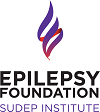 |
 |
 |
 |
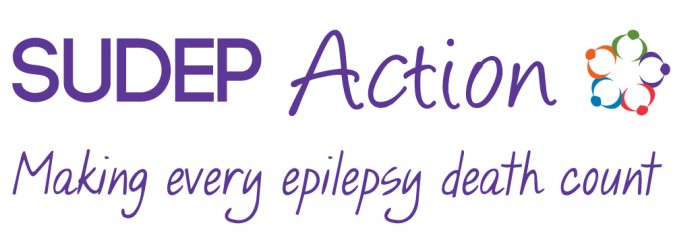 |
 |
 |
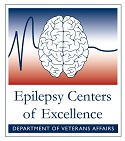 |
 |
Winners of the 2018 Center for SUDEP Research Annual Pilot Program.
The NINDS Center for SUDEP Research is pleased to announce the winners of the 2018 UCB funded Pilot Award Program for SUDEP Research.
 |
|
 |
|
The NINDS Center for SUDEP Research’s Pilot Award Program for 2018 was made possible with two generous research grants from UCB Pharmaceuticals USA, one for a basic science project, and one for a clinical research project. Each award is for $80,000 total costs. Nineteen high quality submissions were made from Europe and USA this year, and reviewed by expert basic science and clinical researchers in SUDEP and epilepsy mortality. Since inception in 2014, the Center for SUDEP Research has had 61 applications from six countries, and has awarded funding to ten pilot projects.
The CSR seeks novel pilot projects that will address the goal of understanding and eliminating SUDEP. This pilot program will award grants to national and international researchers submitting innovative proposals that compliments and expands on the SUDEP research proposed in the CSR. The CSR plans to support one clinical or basic research pilot project (clinical trials will not be funded through this mechanism, but studies involving human subjects are allowed). Aluminum Metal Successful applicants will be expected to work collaboratively with the CSR investigators.
This award is available to both young and established investigators exploring cutting-edge approaches to understanding and preventing human SUDEP. International applicants and applicants from outside the field of epilepsy with novel insight into the causes and prevention of SUDEP are welcome. Investigators already funded by the CSR are not eligible to apply. All materials must be submitted in English.
Recent Funded Projects
Advancing SUDEP risk prediction using a multicenter case-control approach
PI: Orrin Devinsky MD; Samden D. Lhatoo MD, FRCP; Daniel Friedman, MD
This study will combine and harmonize data from 86 epilepsy centers to study a retrospective cohort who succumbed to Sudden Unexpected Death in Epilepsy (SUDEP) to identify clinical, electrophysiological and imaging predictors of SUDEP and develop an individualized model using machine learning methods to predict SUDEP risk. In addition to understanding SUDEP mechanisms through studying a large number of SUDEP cases it will also identify the development and validation of an individual risk calculator which could make a big difference with adult patients trying to gain independence.
Cardiac and Autonomic Pathological Markers for Arrhythmias and Sudden Unexpected Death in Epilepsy Patients
PI: David Auerbach PhD
Patients with epilepsy are at high risk of sudden death from SUDEP. We are not able to predict a patient’s risk of SUDEP. Patients without known SUDEP risk factors account for the largest number of SUDEP cases. In contrast to prior risk factor association studies that are not linked to a proposed cause for SUDEP, this study will develop pathological markers for a proposed SUDEP mechanism. Analytics that are validated in the cardiac field, but are new to the epilepsy/SUDEP field will identify the clinical populations at risk of, and the triggers for, cardiac-mediated SUDEP.
Defining breathing network neuromodulatory approaches for prevention of Sudden Unexpected Death in Epilepsy (SUDEP)
PI: Nuria Lacuey-Lecumberri MD, PhD
Sudden Unexpected Death in Epilepsy (SUDEP) usually occurs in patients with frequent convulsive seizures due to seizure-induced breathing failure. There are currently no technologies or devices available for directly preventing death in patients at high risk. The goal of this project is to improve the overall understanding of breathing control by identifying specific brain areas that are most important for breathing function and stimulation techniques that can be used to prevent seizure-induced breathing failure. The outcome of this research will pave the way for deep brain stimulation devices for breathing rescue as a targeted SUDEP prevention strategy.
An informatics framework for SUDEP risk marker identification and risk assessment
PI: Licong Cui, PhD
The main goal of this project is to develop an informatics approach for automated extraction of SUDEP risk markers from multimodal clinical data to enable individualized SUDEP risk assessment. Success of this study will enable systematic SUDEP risk assessment based on known and putative factors and communication of such risk factors to patients with epilepsy. Ultimately, this study can lead to evidence-based SUDEP risk assessment tools that help clinicians and patients manage potentially modifiable risks, leading to overall reduced SUDEP mortality and improved epilepsy patient care.
The role of central CO2 chemosensitivity in postictal respiratory depression and SUDEP
PI: George B Richerson, MD, PhD
Sudden unexpected death in epilepsy (SUDEP) is the leading cause of death in patients with refractory epilepsy. In many cases, death follows a period of severe seizure-induced respiratory depression, for which the cause is not understood. The proposed research is relevant to public health and the NIH’s mission because a better understanding of the role played by central CO2 chemosensation in the pathogenesis of seizure-induced respiratory depression is expected to lead to the identification of novel candidate biomarkers for SUDEP risk and to the development of new preventive treatments for SUDEP.
Isolating SUDEP risk conferred by genomic co-variation in candidate SUDEP genes
PI: Alica Goldman, MD, PhD
This pilot project aims to evaluate the components of genetic risk in SUDEP in SCN1A gene related epilepsy and in patients with febrile seizure phenotype. Goal of this project is to develop critically needed bioinformatic tools for genomic SUDEP risk stratification. Results will have an immediate impact on patients with epilepsy due to SCN1A gene pathogenic variation and they will inform future bioinformatics and statistical design when analyzing SUDEP risk in patients with the clinically very common febrile seizure phenotype as well as when evaluating causality in existing collections of SUDEP cases.
